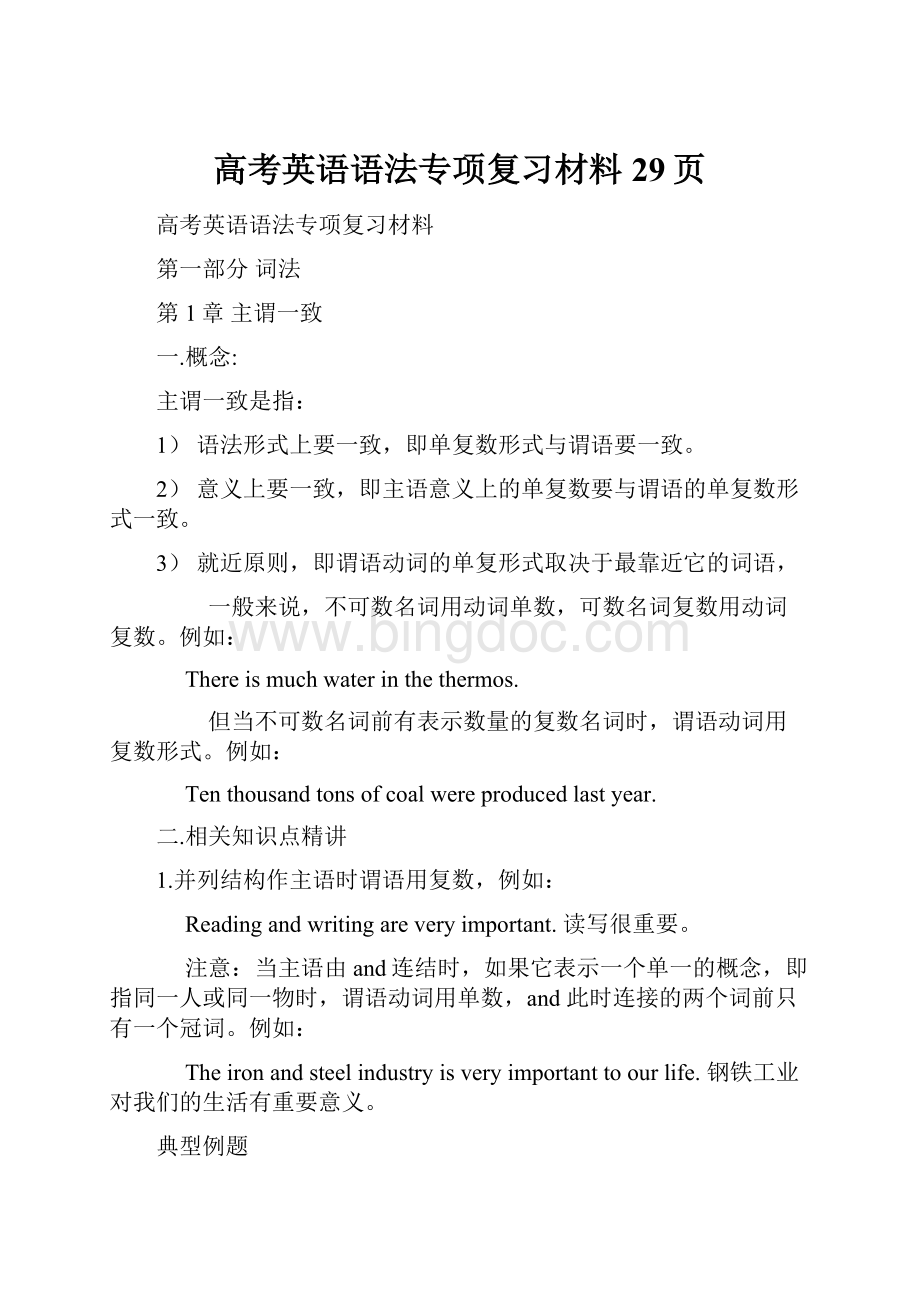高考英语语法专项复习材料29页Word文档格式.docx
《高考英语语法专项复习材料29页Word文档格式.docx》由会员分享,可在线阅读,更多相关《高考英语语法专项复习材料29页Word文档格式.docx(52页珍藏版)》请在冰点文库上搜索。

先从时态上考虑。
这是过去发生的事情应用过去时,先排除A.,C。
本题易误选D,因为TheLeaguesecretaryandmonitor好象是两个人,但仔细辨别,monitor前没有the,在英语中,当一人兼数职时只在第一个职务前加定冠词。
后面的职务用and相连。
这样本题主语为一个人,所以应选B。
2.主谓一致中的靠近原则
1)当therebe句型的主语是一系列事物时,谓语应与最邻近的主语保持一致。
Thereisapen,aknifeandseveralbooksonthedesk.桌上有一支笔、一把小刀和几本书。
Therearetwentyboy-studentsandtwenty-threegirl-studentsintheclass.班上有二十个男孩,二十三个女孩。
2)当either…or…与neither…nor,连接两个主语时,谓语动词与最邻近的主语保持一致。
如果句子是由here,there引导,而主语又不止一个时,谓语通常也和最邻近的主语一致。
Eitheryouorsheistogo.不是你去,就是她去。
Hereisapen,afewenvelopsandsomepaperforyou.给你笔、信封和纸。
3.谓语动词与前面的主语一致
当主语有with,togetherwith,like,except,but,nolessthan,aswellas等词组成的短语时,谓语动词与前面的主语部分一致。
Theteachertogetherwithsomestudentsisvisitingthefactory.教师和一些学生在参观工厂。
HeaswellasIwantstogoboating.他和我想去划船。
4.谓语需用单数的情况
1)代词each以及由every,some,no,any等构成的复合代词作主语时,或主语中含有each,every时,谓语需用单数。
Eachofushasatape-recorder.我们每人都有录音机。
Thereissomethingwrongwithmywatch.我的表坏了。
2)当主语是一本书或一条格言时,谓语动词常用单数。
TheArabianNightisabookknowntoloversofEnglish.《天方夜谭》是英语爱好者熟悉的一本书。
3)表示金钱,时间,价格或度量衡的复合名词作主语时,通常把这些名词看作一个整体,谓语一般用单数。
Threeweekswasallowedformakingthenecessarypreparations.用三个星期来做准备。
Tenyuanisenough.十元够了。
5.指代意义决定谓语的单复数
1)代词what,which,who,none,some,any,more,most,all等词的单复数由其指代的词的单复数决定。
Allisright. 一切顺利。
Allarepresent. 人都到齐了。
2)集体名词作主语时,谓语的数要根据主语的意思来决定。
如family,audience,crew,crowd,class,company,committee等词后,谓语动词用复数形式时强调这个集体中的各个成员,用单数时强调该集体的整体。
Hisfamilyisn'
tverylarge.他家成员不多。
Hisfamilyaremusiclovers. 他家个个都是音乐爱好者。
但集合名词people,police,cattle,poultry等在任何情况下都用复数形式。
Arethereanypolicearound?
附近有警察吗?
3)有些名词,如variety,number,population,proportion,majority等有时看作单数,有时看作复数。
Anumberof+名词复数+复数动词。
Thenumberof+名词复数+单数动词。
Anumberofbookshavelentout.
ThemajorityofthestudentslikeEnglish.
6.与后接名词或代词保持一致的情况
1)用halfof,mostof,noneof,heapsof,lotsof,plentyof等引起主语时,谓语动词通常与of后面的名词/代词保持一致。
Mostofhismoneyisspentonbooks.他大部分的钱化在书上了。
Mostofthestudentsaretakinganactivepartinsports.大部分学生积极参与体育运动。
2)用aportionof,aseriesof,apileof,apanelof等引起主语时,谓语动词通常用单数。
Aseriesofaccidentshasbeenreported.媒体报道了一连串的事故。
Apileoflotswassetbesidethehearth.炉边有一堆木柴。
3)如manya或morethanone所修饰的短语作主语时,谓语动词多用单数形式。
但由morethan…of作主语时,动词应与其后的名词或代词保持一致。
Manyapersonhasreadthenovel. 许多人读过这本书。
Morethan60percentofthestudentsarefromthecity.百分之六十多的学生来自这个城市。
三.巩固练习
()1.Thenumberofpeopleinvited______fifty,butanumberofthem_______absentfordifferentreasons.
A.were,wasB.was,was
C.was,wereD.were,were
()2.E-mail,aswellastelephones,________animportantpartindailycommunication.
A.isplayingB.haveplayed
C.areplayingD.play
()3.______ofthelandinthatdistrict______coveredwithtreesandgrass.
A.Twofifth,isB.Twofifth,are
C.Twofifths,isD.Twofifths,are
()4.Tenminutes______alongtimeforonewhowaits.
A.seemB.seems
C.seemedD.areseemed
()5.Ericistheonlyoneoftheboyswho_____adrivinglicense.
A.hasB.have
C.ishavingD.arehaving’
()6.JoyandSorrow_____next-doorneighbours.
A.isB.areC.wereD.be
()7.Inmyopinion,someofthenews_____unbelievable.
A.areB.isC.hasbeenD.havebeen
()8.When______theUnitedNationsfounded?
A.isB.areC.wasD.were
()9.Everypossiblemeans_____.
A.hastriedB.hasbeentried
C.wastriedD.weretried
()10.Whatshesaysanddoes_____nothingtodowithme.
A.wasB.wereC.hasD.have
()11.There_____adictionaryandseveralbooksonthedesk.
A.areB.mustC.havebeenD.is
()12.Nobody______seenthefilm.It’sapity.
A.butTomandJackhaveB.exceptTomandJackhave
C.butmyfriendshasD.butIhave
()13.Noteacherandnostudent______.
A.areadmittedB.isadmitted
C.areadmittingD.isadmitting
()14.Allbutone______herejustnow.
A.isB.wasC.hasbeenD.were
()15.Whenandwheretobuildthenewfactory_____yet.
A.isnotdecidedB.arenotdecided
C.hasnotdecidedD.havenotdecided
()16.Thewriterandsinger______here.
A.isB.areC.wereD.do
()17.AsIhaveameetingatfour,tenminutes_____allthatIcansparetotalkwithyou.
A.areB.wasC.isD.were
()18.InthosedaysJohnwithhisclassmates_____keptbusypreparingfortheexam.
A.isB.are
C.wasD.were
()19.——____yourclothes?
——No,mine_____hangingoverthere.
A.Isit,isB.Arethese,are
C.Isit,areD.Arethese,is
()20.TheSmith’sfamily,which____ratheralargeone,____veryfondoftheiroldhouses.
A.were,wereB.was,was
C.were,wasD.was,were
()21.Whattheteacherandthestudentswanttosay_____thateitherofthecountries____beautiful.
A.are,areB.is,is
C.are,isD.is,are
()22.Heistheonlyoneofthestudentswho_____awinnerofscholarshipforthreeyears.
C.havebeenD.hasbeen
()23._____ofmybrothersarereporters.Coveringevents,meetings,orsportsmeetings______theirduty.
A.Each,areB.Both,is
C.Neither,areD.None,is
()24.——Whatdoyouthinkofthe______ofthecoat?
——It’sratherhigh.Youcanbuyacheaperoneinthatshop.
A.valueB.costC.priceD.use
()25.——Arethetwoanswerscorrect?
——No,______correct.
A.nooneisB.botharenot
C.neitherisD.eitherisnot
()26.Thewind,togetherwithrainandfog,_____makingsailingdifficult.
A.havebeenB.was
C./D/are
四.答案1.C2.A3.C4.B5.A6.B7.B8.C9.B10.C11.D12.C13.B14.D15.A16.A17.C18.C19.B20.D21.B22.D23.B24.C25.C26.B
第2章动词的时态
一.概念:
时态是英语谓语动词的一种形式,表示动作发生的时间和所处的状态.英语中的时态是通过动词形式本身的变化来实现的.英语有16种时态,但中学阶段较常用的有十种:
一般现在时,一般过去时,一般将来时,过去将来时,现在进行时,过去进行时,将来进行时,过去完成时,英在完成时和现在完成进行时.
1.一般现在时的用法
1)经常性或习惯性的动作,常与表示频腮度的时间状语连用。
时间状语:
every…,sometimes, at…,onSunday。
Ileavehomeforschoolat7everymorning.每天早上我七点离开家。
2)客观真理,客观存在,科学事实。
Theearthmovesaroundthesun.地球绕太阳转动。
ShanghailiesintheeastofChina.上海位于中国东部。
3)表示格言或警句。
Pridegoesbeforeafall. 骄者必败。
此用法如果出现在宾语从句中,即使主句是过去时,从句谓语也要用一般现在时。
例:
Columbusprovedthattheearthisround.哥伦布证实了地球是圆的。
4)现在时刻的状态、能力、性格、个性。
Idon'
twantsomuch.我不要那么多。
AnnwritesgoodEnglishbutdoesnotspeakwell.安英语写得不错,讲的可不行。
比较:
NowIputthesugarinthecup.把糖放入杯子。
Iamdoingmyhomeworknow.我正在做功课。
第一句用一般现在时,用于操作演示或指导说明的示范性动作,表示言行的瞬间动作。
第二句中的now是进行时的标志,表示正在进行的动作的客观状况,所以后句用一般现在时。
2.一般过去时的用法
1)在确定的过去时间里所发生的动作或存在的状态。
时间状语有:
yesterday,lastweek,anhourago,theotherday,in1982等。
Wheredidyougojustnow?
刚才你上哪儿去了?
2)表示在过去一段时间内,经常性或习惯性的动作。
WhenIwasachild,Ioftenplayedfootballinthestreet.我是个孩子的时候,常在马路上踢足球。
WhenevertheBrownswentduringtheirvisit,theyweregivenawarmwelcome.
那时,布朗一家无论什么时候去,都受到热烈欢迎。
3)句型:
Itistimeforsb.todosth "
到……时间了"
"
该……了"
。
Itistimeforyoutogotobed. 你该睡觉了。
Itistimethatsb.didsth."
时间已迟了"
早该……了"
,例如Itistimeyouwenttobed. 你早该睡觉了。
would(had)rathersb.didsth. 表示'
宁愿某人做某事'
I'
dratheryoucametomorrow.还是明天来吧。
4)wish,wonder,think,hope等用过去时,作试探性的询问、请求、建议等,而一般过去时表示的动作或状态都已成为过去,现已不复存在。
Ithoughtyoumighthavesome.我以为你想要一些。
Christinewasaninvalidallherlife.(含义:
她已不在人间。
)
Christinehasbeenaninvalidallherlife.(含义:
她现在还活着)
Mrs.DarbylivedinKentuckyforsevenyears.(含义:
达比太太已不再住在肯塔基州。
Mrs.DarbyhaslivedinKentuckyforsevenyears.(含义:
现在还住在肯塔基州,有可能指刚离去)
注意:
用过去时表示现在,表示委婉语气。
1)动词want,hope,wonder,think,intend等。
Didyouwantanythingelse?
您还要些什么吗?
Iwonderedifyoucouldhelpme.能不能帮我一下。
2)情态动词could,would。
Couldyoulendmeyourbike?
你的自行车,能借用一些吗?
3.一般将来时
1) shall用于第一人称,常被will所代替。
will在陈述句中用于各人称,在征求意见时常用于第二人称。
WhichparagraphshallIreadfirst?
我先读哪一段呢?
Willyoubeathomeatseventhisevening?
今晚七点回家好吗?
2) begoingto+不定式,表示将来。
a.主语的意图,即将做某事。
Whatareyougoingtodotomorrow?
明天打算作什么呢?
b.计划,安排要发生的事。
Theplayisgoingtobeproducednextmonth。
这出戏下月开播。
c.有迹象要发生的事。
Lookatthedarkclouds,thereisgoingtobeastorm.看那乌云,快要下雨了。
3) be+不定式表将来,按计划或正式安排将发生的事。
WearetodiscussthereportnextSaturday.我们下星期六讨论这份报告。
4) beaboutto+不定式,意为马上做某事。
HeisabouttoleaveforBeijing.他马上要去北京。
beabouttodo不能与tomorrow,nextweek等表示明确将来时的时间状语连用。
4.一般现在时表将来
1)下列动词come,go,arrive,leave,start,begin,return的一般现在时可以表示将来,主要用来表示在时间上已确定或安排好的事情。
Thetrainleavesatsixtomorrowmorning.火车明天上午六点开。
Whendoesthebusstar?
Itstarsintenminutes.汽车什么时候开?
十分钟后。
2)以here,there等开始的倒装句,表示动作正在进行。
Herecomesthebus.=Thebusiscoming.车来了。
Theregoesthebell.=Thebellisringing.铃响了。
3)在时间或条件句中。
WhenBillcomes(不是willcome),askhimtowaitforme.比尔来后,让他等我。
I'
llwritetoyouassoonasIarrivethere.我到了那里,就写信给你。
4)在动词hope,takecarethat,makesurethat等的宾语从句中。
Ihopet